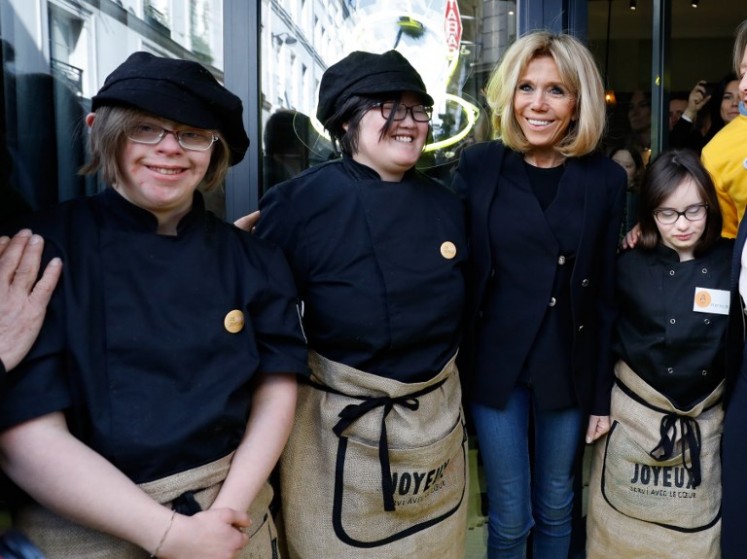Granting Indonesian youth access to reproductive health rights
Both in urban and rural settings, most young people in Indonesia still find it difficult to get accurate information on sexual reproductive health.
Change Size
 Both in urban and rural settings, most young people in Indonesia still find it difficult to get accurate information on sexual reproductive health. (Shutterstock/File)
Both in urban and rural settings, most young people in Indonesia still find it difficult to get accurate information on sexual reproductive health. (Shutterstock/File)
N
indya (not her real name) got pregnant when she was 15 years old and was still in her first year at a high school in Bandung, West Java.
“My boyfriend told me to drink grated young pineapple mixed with soda drinks and arak [homemade distilled alcohol] in order to terminate my pregnancy,” she recalled, adding that she also drank large amounts of herbal medicines to abort the fetus.
Despite her efforts, her pregnancy became more and more visible, forcing her to finally tell her parents about her condition.
“I felt so shocked, ashamed and humiliated to hear my daughter’s confession. But, then I realized that my husband and I, as parents, should bear a huge responsibility for her ‘mistake,’” admitted Nindya’s mother, a lecturer.
With the support of her parents, Nindya gave birth to a healthy baby boy, who is now 7 years old, and she is currently studying at a university in her hometown.
“I had been grappling with feelings of guilt, shame, isolation and desperation for years. If I had been able to get information and access to information on reproductive health and youth-friendly health services earlier, my life would have been different,” said Nindya, who is now an active youth advocate and a peer educator.
Unfortunately, not all young girls who find themselves in the same situation are lucky enough to have loving and empowering parents.
Read also: An introduction to the morning-after pill
Anna, 17, from Papua, admitted she had frequent sex with her boyfriend.
“My friends told me that I would not get pregnant if we had sex standing up,” she said.
Anna got pregnant anyway, and her boyfriend forced her to drink tonics made of bitterroot, which can easily be found in Papua’s forests and is locally believed to induce abortions. She even resorted to swallowing hair dyes, which led to severe bleeding.
Behind all these stories is the reality that in both urban and rural settings, most young Indonesians find it difficult to receive accurate information on sexual reproductive health (SRH) or have access to health clinics that cater to their needs.
Most young people quench their curiosity about sex through pornography found on the internet, porn magazines and tall tales told by friends.
The United Nations Population Fund (UNFPA) defines SRH as a “state of physical, emotional, mental and social wellbeing related to sexuality and to the reproductive health.”
This ranges from learning about puberty and menstruation, and preventing sexually transmitted infections (STI), to understanding the risks of early pregnancy.
Read also: Common problems of the female reproductive system
“It happens in many countries that issues related to sexual and reproductive health and rights [SRHR], particularly on contraception for unmarried young people, and incorporation of comprehensive SRH education in the curriculum are sensitive, given social, cultural and religious norms,” said Annette Robertson Sachs, a representative of UNFPA Indonesia.
“While there was a readiness to listen to youths’ voices, government officials felt that they could not accommodate the needs of all young people.”
Therefore, it is important that government works together with the private sector, including NGOs and youth networks, to fulfill the needs of all young people, particularly on sensitive issues such as sexual and reproductive health, she said.
However, Robert Blum, a professor at the department of Population and Reproductive Health at the Johns Hopkins Bloomberg School of Public Health, said that in Indonesia and many neighboring Asian countries, SRH remains a taboo topic that is never discussed at home or taught in schools.
“[The] youth are often missing out in important information that, in many cases, can save their lives,” said Blum, who conducts research and studies on youths around the world.
Very few outlets of information and service provisions exist for Indonesian youths.
“Moreover, SRH messages often focus on physical things, such as prevention of sexual transmission infection or family planning — topics that may not resonate with youth. Instead, educators or advocates should link SRH with topics related to boosting youth’s self-worth, self esteem and feeling good about their bodies, their futures and developing healthy relationships with female and male friends.”
Failing to meet the needs of Indonesia’s younger generation in providing SRH information may lead to increasing numbers of unwanted pregnancies, teen marriages and sexual violence.
A qualitative joint study by the University of Gajah Mada medical school’s Center for Reproductive Health and the Johns Hopkins Bloomberg School of Public Health Center for Communication Program (JHUCCP) conducted in 18 cities and regencies across nine provinces in early 2017, reveals that adolescents — youths aged 10-19 years old — are increasingly permissive toward sexual behavior.
The study says around 6 percent of adolescents have had sexual intercourse, and about 0.1 to 0.4 percent of boys and girls had sexual intercourse for the first time at the age of 15-17 years old.
The study also shows that approximately 2.4 percent of adolescents are married, and around 9.5 percent of girls aged 15-19 years old have already given birth or were currently pregnant.
It is estimated that 500,000 adolescent girls give birth every year in Indonesia.
“The study reveals a harsh reality […] in Indonesia and therefore, it is very crucial to address adolescent issues, and their sexual reproductive health and rights — which will lead to long-terms benefits for Indonesia,” said JHUCCP Indonesia representative Fitri Putjuk.
Indonesia’s adolescent population stands at about 45.8 million, or 13.3 percent of its 259 million population.
“By 2030, these adolescents will reach the peak productive years of their 30s. Unless we provide them with the necessary skills and knowledge [about] SHR, Indonesia will lose the opportunity to gain from its demographic dividend,” Fitri said.
What youth really need
Young people are often viewed as a problem group rather than a forceful power that can make a difference.
But with Indonesia’s youth population reaching 65 million, their voices and participation must become an integral part of the policy making process, especially on issues that affect their lives.
Jointly organized by the National Population and Family Planning Board (BKKBN) with support from partners, including the Bill and Melinda Gates Foundation, Johns Hopkins Bloomberg School of Public Health Center for Communication Program, Rutgers, UNFPA and UNICEF, the first National Adolescents Summit, recently held in Yogyakarta, provided a platform for young people to have an important and irreplaceable role in promoting sexual and reproductive health (SRH).
The main objective was producing a well-rounded program involving all stakeholders committed to bringing SRH to the doorstep of those who need it. The most important ingredient of this process was youth participation and engagement.
“Young people have the energy to drive changes in their communities. They must be given wide access to information and knowledge on reproductive health and family planning services,” said Melinda Gates, co-founder of the Bill and Melinda Gates Foundation, in addressing the summit.
Youth, she said, must be involved from the very beginning as “problem solvers and architects of solutions,” rather than just as beneficiaries.
“With that, Indonesia will have healthy, well-educated and well-informed youth and the economic returns will be huge. Indonesia will be able to reap its demographic dividend in the coming years.”
Youth leaders from diverse organizations, including the Indonesian Youth Alliance (ARI), Association of Indonesian Medical Students, Genre, Fathayat, PKBI’s youth associations and others gathered for three days to address various challenges and to come forward with drafts of solutions.
Auzan Haq, a member of the Center for Youth Information and Consultation in Makassar, South Sulawesi, said he hoped the summit would open doors to more collaboration among youth groups, the government, private sector, civil society and donors.
“The government, civil society groups and the media have the responsibility to educate adolescents on reproductive health. There is nothing taboo about this.”
Pre-marital sex among teens is a subject considered taboo in the country. It goes against traditional Indonesian social and cultural norms, yet a lot of young people in big cities as well as those living in remote villages are sexually active.
“We cannot ignore this fact by sitting doing nothing,” said Marselina Putri Yamina Manimoi, 21, a peer educator from Kupang, East Nusa Tenggara.
“Early sexual interactions are common and regarded as something to be proud of. Sex is seen as proof of love,” said Manimoi, adding that this has resulted in an increasing number of unwanted pregnancies and teen marriages in Eastern Indonesia.
“This happens because we do not understand our own bodies. And both our parents and teachers never teach us about this.”
Among participants were numerous young people with physical disabilities. The World Health Organization (WHO) states that persons with disabilities have the same SRH needs as other people. Yet, they often face barriers in accessing information and services.
WHO also adds that persons with disabilities may actually have greater needs for SRH education and cares due to their vulnerability to abuse.
Persons with disabilities are up to three times more likely than non-disabled persons to be victims of physical and sexual abuse, including rape.
Nineteen-year-old Hariyan Tuah Miko, a physically disabled teen and activist of Young Voice Indonesia from Aceh, expressed concerns with the state of SRH awareness.
According to Miko, there are hundreds of disabled youth in Aceh. “In Aceh, many parents hide their disabled children, who are regarded as a disgrace to the family. Therefore, it is almost impossible for disabled youth to get any information on SRH, let alone its services.” Aceh is the only province in Indonesia where practice of Sharia law is strictly enforced.
Many disabled girls in the province are victims of rape, sexual abuse and violence.
Wulaninka, a Jakarta-based member of Young Voice Indonesia and wheelchair user, said that very few organizations provided services and information for adolescents with physical disabilities. What the youth need, she said, was youth-friendly information and non-discriminatory, non-judgmental reproductive health information centers and services.
“We want to make sure that our voices and concerns are included throughout the process of designing programs and formulating policies on SRH for all youth.”









